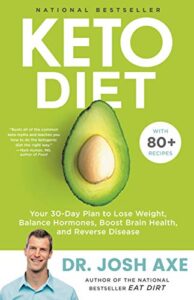This site is supported by our readers. We may earn a commission, at no cost to you, if you purchase through links.
You’ve seen the claims: a spoonful of coconut oil will melt stubborn fat, crank up your metabolism, and help you finally lose those lingering pounds. It’s an idea that refuses to die, no matter how many trends come and go.
But step away from the glossy promises, and coconut oil’s story gets complicated. High in MCTs and everywhere in diet culture, it sits at a crossroads of old tradition and modern myth.
If you’re wondering where the science ends and the hype begins, you’re in the right place—understanding coconut oil for weight loss means cutting through the noise to find what genuinely works.
Table Of Contents
- Key Takeaways
- The Science Behind Coconut Oil and Weight Loss
- Comparing Coconut Oil to Other Oils
- Health Benefits and Risks of Coconut Oil
- Using Coconut Oil in a Weight Loss Diet
- Top 3 Products for Coconut Oil Weight Loss Support
- Frequently Asked Questions (FAQs)
- Can coconut oil help me lose weight?
- How much coconut oil should I consume for weight loss?
- Is coconut oil better for weight loss than other oils?
- Can I consume coconut oil on a low-calorie diet?
- Is coconut oil safe for people with nut allergies?
- Does coconut oil expire or lose potency over time?
- Are there signs of coconut oil intolerance or allergy?
- How should coconut oil be stored for freshness?
- Conclusion
Key Takeaways
- Coconut oil’s impact on weight loss is minimal, offering only modest benefits compared to other oils and working best as a replacement, not an addition, in a calorie-controlled diet.
- Research shows coconut oil raises both “bad” (LDL) and “good” (HDL) cholesterol, with its high saturated fat content increasing heart disease risk if used excessively.
- MCT oil outperforms coconut oil for boosting fat oxidation and satiety, while olive oil and polyunsaturated vegetable oils generally support better metabolic and weight outcomes.
- Sustainable weight loss comes from overall calorie control and physical activity, not from relying on coconut oil or any single food as a quick fix.
The Science Behind Coconut Oil and Weight Loss
You’ve probably heard coconut oil called everything from a miracle metabolism booster to just another overhyped fad. The truth lies somewhere in the middle, and it comes down to understanding what’s actually happening in your body when you consume this tropical fat.
Let’s break down the real science behind coconut oil’s effects on weight loss, starting with what makes it different from other cooking oils.
Medium-chain Triglycerides (MCTs) in Coconut Oil
Coconut oil’s magic ingredient? Medium-chain triglycerides (MCTs). These fats make up about 54% of coconut oil by weight, with lauric acid leading the charge at roughly 42%. Here’s what sets MCTs apart from their long-chain cousins:
- MCT Absorption Rates: Your body absorbs MCTs at 98-100%, compared to just 36-82% for longer-chain fats
- Ketone Production: MCTs head straight to your liver, boosting ketone production
- Energy Expenditure: They can increase your 24-hour calorie burn by up to 5%
Given its composition, coconut oil provides a broader spectrum of fatty acids than MCT oil.
Metabolism Effects and Fat Burning
So what happens once those MCTs hit your system? The fat-burning claims deserve a closer look. Animal studies show coconut oil activates brown fat thermogenesis—mice maintained body temperature longer under cold stress and burned more energy day and night. In humans, though, results tell a different story:
| Effect | Animal Research | Human Trials |
|---|---|---|
| Thermogenesis Activation | Significant increase | No acute change |
| Fat Oxidation | Enhanced hepatic metabolism | Minimal difference vs. olive oil |
| Energy Expenditure | Elevated VO₂ consumption | Modest 24-hour boost |
| Body Composition | Reduced adipose tissue | Small BMI changes (0.01 kg/m²) |
Your metabolism won’t suddenly rev into overdrive from coconut oil alone—Ketone Production increases, yes, but weight loss effects remain modest without calorie control. Studies suggest coconut oil may also play a role in preventing hepatic fat.
Coconut Oil’s Impact on Appetite and Satiety
Beyond metabolism, you’re probably wondering if coconut oil actually curbs your hunger. The data’s mixed: 26 grams reduced daily caloric intake versus olive oil in some trials, with Subjective Fullness peaking at 180 minutes post-meal.
Yet other studies found no difference in appetite or energy consumption. Satiety Hormones like PYY increased slightly, but Mechanistic Observations suggest Weight Status matters—normal-weight individuals responded better than obese participants.
Research Findings and Clinical Trial Results
When clinical trial evidence lands on your desk, you want straight answers—not spin. Here’s what randomized controlled trials actually show:
- Most study participants took 1-3 tablespoons daily over 4-12 weeks, with one trial extending to two years
- Weight loss averaged just 0.04 kg compared to other oils—statistically significant but clinically negligible
- Body composition improved modestly in some studies, particularly waist circumference in obese participants
- Metabolic parameters like insulin and triglycerides showed favorable changes, though limitations found include inconsistent outcomes across populations and trial durations
Comparing Coconut Oil to Other Oils
You’ve probably heard coconut oil pitched as the best fat-burning miracle, but how does it actually stack up against the oils already sitting in your kitchen?
The truth is, not all oils are created equal with regard to their effects on your metabolism and body composition. Let’s compare coconut oil to a few popular alternatives so you can make informed choices about which fats deserve a spot in your weight loss strategy.
MCT Oil Vs Coconut Oil for Weight Loss
You’ve probably seen MCT oil and coconut oil marketed interchangeably, but they’re not twins. MCT oil delivers 100% medium-chain triglycerides, while coconut composition includes only about 54% MCTs—the rest behaves like standard fats.
Clinical evidence shows MCT oil produces stronger satiety effects and greater fat oxidation than coconut oil. For weight loss, MCT metabolism offers practical advantages: faster ketone production and measurably reduced caloric intake at meals.
Olive Oil and Its Weight Management Benefits
Olive oil deserves more credit than coconut oil for weight management. Regular consumption reduced abdominal fat accumulation fivefold in large-scale studies, while clinical trials showed 80% of participants lost over 5% body weight on olive oil-enriched diets.
Its monounsaturated fats boost satiety hormones like serotonin, helping you eat less naturally. The metabolic effects support long-term prevention of obesity better than saturated fat alternatives.
Vegetable Oils and Their Effects on Body Fat
When you replace saturated fats with polyunsaturated vegetable oils, your abdominal fat area shrinks even if the scale doesn’t budge. Soybean and sunflower oils showed mixed results on adiposity in recent trials, while sesame and canola oils reduced body fat percentage consistently.
Blended oils outperform single seed oils for insulin resistance, making saturated fat replacement a smarter strategy than adding coconut oil for reducing belly fat.
Health Benefits and Risks of Coconut Oil
Before you replace your entire pantry with coconut oil, you need to understand what you’re actually getting into. The truth is, coconut oil isn’t just a simple weight loss solution—it comes with real benefits and some legitimate concerns that you can’t ignore.
Let’s break down what the research actually shows about cholesterol, heart health, and how your body reacts to this controversial fat.
Coconut Oil and Cholesterol Levels
You’ve probably heard coconut oil won’t wreck your cholesterol—but the data tells a different story. Here’s what actually happens to your lipid profile:
- LDL cholesterol jumps by about 10.5 mg/dL compared to plant oils, raising your “bad” cholesterol
- HDL cholesterol climbs by 4 mg/dL, boosting the “good” kind
- Total cholesterol increases roughly 15 mg/dL over vegetable oils
- The cholesterol ratio stays similar to olive oil but better than butter
Your heart health deserves honest answers, not wishful thinking.
Effects on Heart Health and Inflammation
Regarding coconut oil and heart health, the inflammation story isn’t as clear-cut as the cholesterol impact. A 2020 meta-analysis found coconut oil doesn’t markedly change C-reactive protein—a key inflammation marker—compared to vegetable oils.
While some studies hint at improved vascular health and endothelial function, the jump in LDL cholesterol translates to roughly 6% higher heart disease risk. Not exactly a free pass.
Potential Risks of High Saturated Fat Intake
Here’s what keeps me up at night as a dietitian: coconut oil is 83% saturated fat—far surpassing lard or olive oil. Within just 24 days, high saturated fat intake can spike LDL cholesterol by 10% and boost liver fat by 20%, ramping up heart disease and mortality risks.
Coconut oil’s 83% saturated fat content can spike LDL cholesterol and liver fat in just weeks, sharply increasing heart disease risks
The AHA guidelines are clear: avoid coconut oil to protect your lipid profile and cardiovascular health.
Impact on Blood Sugar and Insulin Sensitivity
Beyond cardiovascular concerns, coconut oil’s impact on blood sugar and insulin sensitivity tells a more nuanced story. Here’s what the research reveals:
- Acute coconut fat intake raised postprandial glucose levels compared to control meals
- Long-term use increased insulin resistance markers (HOMA-IR) in some studies
- Daily 6-gram doses decreased blood glucose by 25 mg/dL in supplementation trials
- MCT effects showed 30% improved insulin-mediated glucose disposal versus long-chain fats
- Dose outcomes and oil comparisons remain inconsistent across human trials
Your metabolism and glycemic control may respond unpredictably to coconut oil.
Using Coconut Oil in a Weight Loss Diet
If you’re thinking about adding coconut oil to your weight loss plan, you need a practical game plan that goes beyond the hype. The truth is, coconut oil won’t work magic on its own—it requires thoughtful integration into an already balanced approach to eating and movement.
Here’s what you actually need to know about using coconut oil effectively, from daily amounts to the bigger picture of sustainable weight management.
Recommended Daily Intake and Usage Tips
If you’re considering coconut oil for weight loss, start with one to two teaspoons per day, then build up gradually to avoid digestive issues. Most experts cap the daily dose at two tablespoons (28 grams) to respect saturated fat limits. Use it as a cooking substitute rather than an add-on, and always prioritize calorie control alongside coconut oil consumption for meaningful results.
| Strategy | Recommendation |
|---|---|
| Starting Dose | 1–2 teaspoons daily |
| Maximum Daily Dose | Up to 2 tablespoons (28 grams) |
| Usage Method | Replace other fats in cooking |
| Dietary Approach | Part of calorie-controlled plan |
| Gradual Increase | Allow digestive adaptation |
Incorporating Coconut Oil Into Meals and Recipes
Once you’ve settled on your daily dose, swap coconut oil into your cooking fats rotation. Sauté vegetables at medium heat, blend a tablespoon into smoothie recipes for added satiety effects, or use it in baking to cut butter’s saturated load by up to 30%.
Usage patterns matter: substitution beats addition when caloric impact is your concern, and research benefits emerge most clearly within healthy eating strategies that prioritize whole foods.
Coconut Oil and Balanced Diet Strategies
Your balanced diet strategy should treat coconut oil as just one piece of the puzzle, not the hero ingredient. Leading nutrition organizations don’t recommend it as your primary dietary fat source—that high saturated fat content demands limits of 1–2 tablespoons daily.
Real weight loss strategies combine coconut oil with fiber-rich foods, lean protein, calorie control, and physical activity for results that actually stick.
Importance of Overall Calorie Control and Physical Activity
Here’s the truth: weight loss hinges on creating a calorie deficit, not on any single food. Reducing calorie intake by 500 calories daily can help you lose 0.5 to 1 pound weekly, but you’ll see better results combining diet with physical activity.
Aim for 150 to 300 minutes of exercise weekly for weight maintenance and long-term success.
Top 3 Products for Coconut Oil Weight Loss Support
Curious about what’s actually worth trying? Let’s look at three products people are turning to for support when adding coconut oil to their weight loss routine.
Here’s how they stack up.
1. Keto Diet Lose Weight and Thrive
Curious about how Keto Dieting and coconut oil collide in real-world results? The “Keto Diet Lose Weight and Thrive” plan leans on MCT benefits—think faster metabolism and potential increases in HDL cholesterol.
Clinical trials highlight that swapping in coconut oil (rich in MCTs) can modestly shrink waist circumference and boost good cholesterol, even without slashing calorie intake.
For you, this means keto isn’t all theory; you’re getting a practical, step-by-step guide for weight loss that’s grounded in measurable change.
Best For: Anyone who wants a structured, science-backed keto plan to lose weight, balance hormones, and improve brain health, especially those looking for variety and practical guidance.
- Includes a 30-day plan with step-by-step advice, over 80 recipes, and different keto options to fit personal goals.
- Science-backed benefits like fat loss and better cholesterol, even without drastic calorie cuts.
- Helpful tools like shopping lists and exercise routines make it easy to stay on track.
- Upfront investment in some supplements and specialty ingredients is needed.
- Not suitable for everyone, especially people with certain health conditions.
- Diet can lead to a “keto flu” or plateau, and requires real commitment to see results.
2. Ancient Remedies Healing With Natural Medicine
Looking for a weight loss approach that goes deeper than calories in, calories out? Ancient Remedies Healing With Natural Medicine gives you a modern roadmap straight from the wisdom of Ayurvedic use and Chinese medicine.
Traditional healers have relied on coconut oil for wound healing, bone health, and metabolism support for centuries. Today, those same comprehensive techniques—like adding coconut oil to a healthy diet—offer a practical path for anyone driven to experience the health benefits ancient cultures trusted long before today’s diet fads.
Best For: People who want natural, holistic solutions for chronic health issues and are open to exploring ancient healing practices.
- Covers time-tested remedies from multiple ancient traditions, making it useful for readers interested in a comprehensive guide.
- Offers practical recipes and suggestions for herbs, essential oils, and coconut oil, making natural wellness approachable.
- Includes clinical data and traditional perspectives, providing both scientific insight and cultural context.
- Kindle version may have missing chapters or formatting issues, potentially frustrating some readers.
- Dense and information-rich, requiring slow reading and note-taking for full benefit.
- Not a substitute for professional medical care and may not appeal to those who prefer conventional treatments.
3. Collagen Keratin Hair Mask Treatment
Ever noticed how your hair’s condition mirrors your overall health journey? Collagen keratin masks—infused with coconut oil—promise more than surface shine. They bring true hair repair, measurable frizz reduction, and visible hydration effects, thanks to ingredients like hydrolyzed proteins and antioxidant-rich oils.
As market growth climbs and consumers get savvier about ingredient benefits, these treatments aren’t just a trend—they reflect a broader shift toward nutrition, healthy fats, and collagen protein for better self-care, inside and out, as part of your weight loss toolbox.
Best For: Anyone with damaged, dry, color-treated, or frizzy hair who wants reliable hydration, frizz control, and a silkier feel from a science-backed, salon-grade mask.
- Repairs, hydrates, and smooths hair with four hydrolyzed proteins and nourishing natural oils.
- Clinically shown to reduce breakage, increase shine, and boost hair strength after regular use.
- Safe for all hair types, free from harsh chemicals, cruelty-free, and biodegradable.
- The price is steep at $99.99, making it a splurge for some users.
- Results may vary—not every user experiences dramatic improvement.
- Not suitable for those with allergies or sensitivities to certain natural oils or botanical extracts.
Frequently Asked Questions (FAQs)
Can coconut oil help me lose weight?
Can coconut oil help you lose weight? The evidence suggests only modest results, despite talk about MCT metabolism and satiety levels.
Clinical evidence points toward small changes at best, making realistic expectations and overall dietary integration your stronger weight loss strategies.
How much coconut oil should I consume for weight loss?
Worried about overshooting recommended saturated fat limits? For most, dosing recommendations suggest 1–2 tablespoons daily, split between meals.
Offset those calories elsewhere, consider individual tolerance, and focus on calorie control—weight loss doesn’t hinge on coconut oil alone.
Is coconut oil better for weight loss than other oils?
Regarding Oil Comparison Efficacy for weight loss, clinical trial results show coconut oil isn’t better than olive oil or most vegetable oils.
In fact, MCT oil consistently outperforms coconut oil for effective fat reduction and metabolic boost.
Can I consume coconut oil on a low-calorie diet?
Picture a client swapping butter for coconut oil, aiming for weight loss. You can include coconut oil on a low-calorie diet, but mind its calorie density and saturated fat—portion control matters, or you’ll risk displacing nutrients.
Is coconut oil safe for people with nut allergies?
You’ll rarely see a true coconut allergy in nut-allergic folks—prevalence is low, cross-reactivity risks minimal, and oil protein content is negligible.
The FDA no longer classifies coconut as a major allergen, making coconut oil generally safe.
Does coconut oil expire or lose potency over time?
Coconut oil, whether extra virgin or refined, doesn’t last forever. Factors like storage conditions and light exposure cut shelf life.
Watch for oil expiration signs—yellow color, sour odor, gritty texture—since rancidity health risks increase as coconut oil degrades.
Are there signs of coconut oil intolerance or allergy?
Just as a chameleon can blend in unseen, allergy prevalence to coconut oil is often underestimated.
Watch for cutaneous symptoms like hives and eczema, GI reactions, or respiratory signs—especially if there’s cross-reactivity with other nuts in your diet.
How should coconut oil be stored for freshness?
Store coconut oil in a cool, dry spot out of sunlight, using airtight glass or BPA-free containers. This preserves coconut oil benefits and shelf life.
Signs of spoilage include sour odors, discoloration, or mold—throw out if detected.
Conclusion
A watched pot never boils, and so it’s with chasing quick solutions like coconut oil for weight loss—results rarely materialize as promised. True change relies on sustained, mindful choices, not miracle ingredients.
While research gives coconut oil some interesting qualities, no oil alone will shift the scale. If you’re seeking progress that lasts, focus on routine, balance, and what you can maintain for life. That’s where real transformation—and clarity beyond the hype—takes root.












